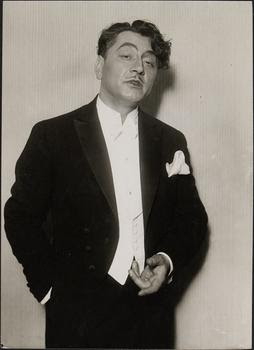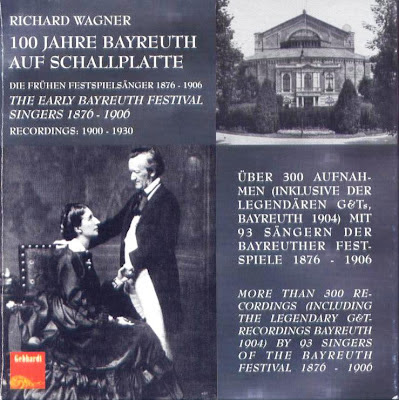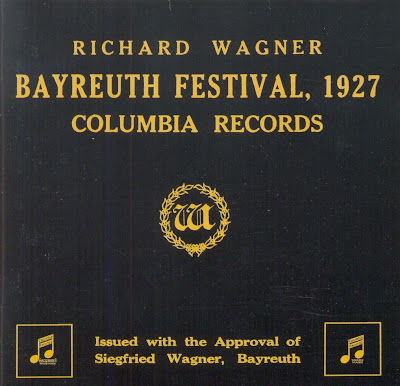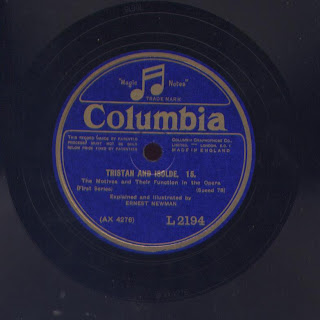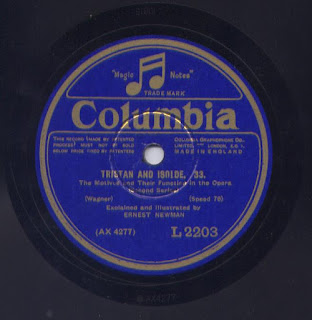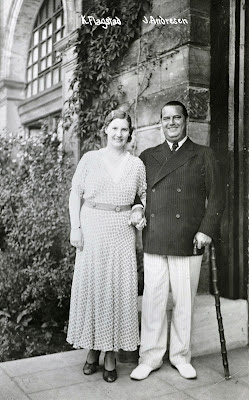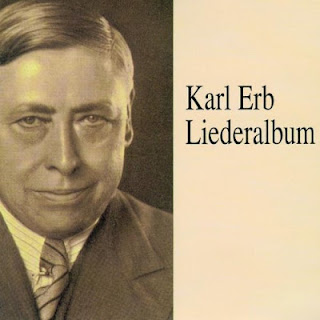Der Sänger, den ich heute vorstellen möchte, war einer der vielen jüdischen Künstler, die in den 30er Jahren Deutschland unfreiwillig verließen und in den USA eine, in diesem Fall bescheidene, Karriere machten. Das Besondere bei Ernst Wolff war, dass er nur als Liedsänger auftrat und sich bei seinen Liederabenden selbst am Klavier begleitete. Zwar mag er damit, wie im Kutsch/Riemens Sängerlexikon vermerkt ist, großen Erfolg gehabt haben, richtig populär wurde er aber wohl nie. Dazu war das Repertoire des deutschen Kunstliedes doch zu speziell und seine Stimme, ein hoher beweglicher Bariton, zu wenig spektakulär. Jedenfalls sind kaum Fotos von ihm zu finden, und die ca. 40 Platten, die er in den 30er-Jahren für Columbia gemacht hat, fanden keine weite Verbreitung und sind selten. Andererseits ist es auch kein Sänger, der vom Mainstream der Schellack-Sammler gesammelt wurde, so dass seine Platten vielleicht auch deshalb selten zu finden sind.
Ich stelle im folgenden ein paar Informationen über ihn zusammen, die ich gefunden habe. Zunächst das Sängerlexikon:
Wolff, Ernst, Bariton, * 1.3.1905 Baden-Baden, † 1991; er war der Sohn eines jüdischen Kantors und arbeitete zunächst in Frankfurt a.M. als Angestellter. Er nahm dann Gesangsunterricht und studierte am Hoch'schen Konservatorium in Frankfurt a.M. Musiktheorie und Klavierspiel u.a. bei E. Sekles und bei L. Rottenberg. 1925-30 war er als Opern- und Konzertrepetitor in Frankfurt a.M. tätig, seit 1931 Korrepetitor an der dortigen Oper; gleichzeitig hatte er eine erfolgreiche Karriere als Konzert- und Liedersänger. Seit 1933 konnte er als Jude in Deutschland nur noch beim Jüdischen Kulturbund in Frankfurt a.M. in Konzerten und Liederabenden auftreten, eine Tätigkeit, die er bis 1938 fortsetzte. Man erlaubte ihm sogar Auslandsreisen; so gab er im Dezember 1934 einen Liederabend beim englischen Rundfunk BBC und trat 1936 in New York auf. Nachdem er schließlich aus Deutschland geflüchtet war, veranlaßten Max Reinhardt und Kurt Weill ihn, in die USA zu kommen. Hier entschloß er sich, dem Beispiel des berühmten Interpreten Sir George Henschel zu folgen und Konzerte zu geben, bei denen er Lieder vortrug und sich selbst am Flügel begleitete. Er hatte damit in den USA große Erfolge wie auch mit zahlreichen Schallplatten, die bei Columbia herausgebracht wurden. Darauf wurden für damalige Verhältnisse in Amerika ganz unbekannte Kompositionen publiziert, so eine Serie mit Liedern von Robert Franz, eine Sammlung mit Vokalwerken von Clara Schumann, eine andere mit Werken der Familie Bach, mit mittelalterlichen deutschen Liedern, mit Liedkompositionen von Franz Liszt. All diese Aufnahmen bezeugen die hohe Musikalität und den erlesenen Geschmack des Interpreten. Er wirkte in den USA als Pädagoge an mehreren Universitäten, unternahm aber immer wieder seine Konzertreisen, die ihn seit 1948 auch wieder in die europäischen Musikzentren führten. Er lebte später in Breganzona im Schweizer Kanton Tessin. Er ist auch unter dem Namen Ernst Lewin-Wolff aufgetreten.
[Lexikon: Wolff, Ernst. Großes Sängerlexikon, S. 26150
(vgl. Sängerlex. Bd. 5, S. 3757) (c) Verlag K.G. Saur]
In den 50er-Jahren machte er einige Aufnahmen für Folkways-Records mit „deutschem Liedgut“ wie Volksliedern, Studentenliedern oder Weihnachtsliedern, die als Downloads noch erhältlich sind:
Ernst Wolff, der ursprünglich Korrepetitor war und in im Opernhaus zu Frankfurt am Main wirkte, dirigierte die Uraufführung von Hindemiths "Lehrstück", einer Komposition für zwei Männerstimmen, Sprecher, Chor, Orchester, Fernorchester, Tänzer und Clowns, das als Komposition heute vergessen ist. Ebenfalls vergessen ist das Stück „Der gestiefelte Kater“ von Emil Alfred Hermann, Untertitel: Ein Volksmärchen mit Musik und Reigen in vier Akten, dessen Erstaufführung von Wolff geleitet wurde. Es verlangt eine Damenstimme, 11 Männerstimmen, 5 Kinder und Nebendarsteller. Der Komponist, über den ich nicht viel herausbekommen konnte, hat weitere Märchen der Gebrüder Grimm vertont, und komponierte anscheinend hauptsächlich für Kinder. Vielleicht ein Musiklehrer? Das Aufführungsmaterial kann heute noch ausgeliehen werden.
Der gestiefelte Kater
Ein Volksmärchen mit Musik und Reigen in vier Akten
1D, 11H, 5 Kinder, Nebendarsteller
Orchesterbesetzung: 2 Fl, 2 Ob, 2 Kl, 2 Fg, 2 Hr, 2 Trp, Pk, Vl I, II, Va, Vc, Kb, Hrf, Schl
Eine Diskographie von Ernst Wolff erschien mit einem Artikel im „Record Collector“, vermutlich um 1980 herum. Ich habe zwar eine Fotokopie davon, kann aber nicht genau sagen, aus welchem Jahr der Beitrag stammt. Der Artikel über Wolff lautet wie folgt:
THE RECORD COLLECTOR
ERNST WOLFF
by Ronald Russell
It was in the late 1940s that 1 first became aware of Ernst Wolff. As a beginner in record collecting, I used to read and re-read the books on recorded music by B. H. Haggin, David Hall and Irving Kolodin, and it occurred to me that Wolff was the one artist who consistently came in for bad criticism.
B. H. Haggin wrote:
'As for Die schöne Müllerin you may have a friend with a pleasant voice who can sit down at the piano and sing through the songs for you; if not, Ernst Wolff will do it for you, but he will do no more than that; there is in his singing none of the imaginative insight and evocative power that there would be in the singing of a great artist.'
Irving Kolodin:
“I cannot endorse this as more than a sincere, misguided effort. Wolff's voice is at best a parlor baritone, and the demands of this music are such that it is too seldom heard at its best. He sings the songs with the intensity of a man who loves the material, and an occasional one of the slower songs is affectingly delivered. But that is asmall accomplishment when Schubert has given a singer so much to work with. He is, of course, his own accompanist and only tolerably good. The recording is satisfactory, but no one wholly dependent on this interpretation could say that he really knows the songs.”
and finally David Hall:
'It would be a pleasure to say that the complete recording of this great song cycle was truly worth having, but such is not the case. Ernst Wolff has a pleasant, informal manner of presentation, but he is no great artist — lacking badly in vocal warmth, flexibility and artistic subtilty.'
Reading all these made me wonder just how bad he was. At that time, nothing of Ernst Wolff was available, and it was not until 1961 that I happened to find acopy of the Brahms Deutsche Volkslieder (Columbia X-128) in a junk shop. I was then interested in the kind of repertoire that Wolff sang, and this was my first chance to make my own judgment. When I put the first record on, it was a pleasant surprise, for he was an excellent singer. In my estimation, he compared quite favourably with Fischer-Dieskau, and other lieder singers. From then on, I resolved to get all of the 78 rpm recordings he made — entirely for Columbia — between the years 1935-42. This is a project which I recently completed.
Born in Baden-Baden on 1st March, 1905 he received his musical education in Berlin. Frankfurt on Main, and in Milan. He began his career as a concert pianist giving recitals and appearing as soloist with Symphony Orchestras. He was also an accompanist, but it is not known to whom.
At the age of 23. he was appointed musical director of the School ofOpera at the Frankfurt Conservatory. Whilst conducting a performance of Mozart's Marriage of Figaro, he was discovered by Clemens Krauss, and engaged as a conductor at the Frankfurt Opera.
While there, Wolff conducted the world premiere of the Fairy Tale — "Puss in Boots" by E.A. Herrmann on 9th December 1932. During this period Paul Hindemith engaged him for the International Chamber Music Festivals at Baden-Baden where he conducted the first performance of Hindemith's Lehrstück, a composition for two male voices, speaker, chorus, orchestra, distant orchestra, dancer, clowns and crowd. He also distinguished himself as guest conductor throughout Germany.
Also during this time at the Frankfurt Opera, Wolff decided that he would have a much better understanding of his position if he learned to sing. At an opera dress rehearsal, one of the singers was suddenly taken ill. Ernst Wolff took over the role, singing it so well, that his fellow musicians advised him to undertake a singing career. He did this, studying seriously with Johannes Willy in Frankfurt and later with Moralli in Milan.
During the 1933 upheavals in Germany. Wolff was forced to leave his post in Frankfurt because he was Jewish. After 1933, he gave lieder recitals to his own accompaniments in England, Italy, Germany. Austria, Holland and Switzerland. The critic of the London Morning Post wrote: "To hear music of such completely different styles sung with the ease and aptitude shown by Ernst Wolff is most unusual. This musicianly and sensitive singer is certainly an artist much above the average, who utilises his fine baritone voice with indubitable effect."
After 1935, Wolff was in America, in New York, where he began to make recordings for Columbia. He also broadcast many times over WQXR. It is noted that he taught and gave lieder recitals in 283 American and Canadian Universities and Colleges. He had originally come to the USA for the New York production of Franz Werfel's The Eternal Road. Max Reinhardt and Kurt Weill, who had previously heard him in a Lieder recital, engaged him as singer and musical assistant for that production. Wollf also collaborated with Milhaud.
It is interesting that he recorded repertoire which was mainly off the beaten-track in the 78 days. The first and only sizeable selection of songs by Robert Franz, and Franz Liszt. An interesting album of Lieder by Erich Wolff (no relation) — only Florence Easton on a super-rare Victor (1731) had recorded two songs and these are not included on Ernst Wolff's collection.
All in all, Wolff's recordings could be considered an Anthology from early German songs — (Glogauer Liederbuch, 1460) to 20th Century, which is represented by the one and only recording of Max Kowalski's Song Cycle, Pierrot Lunaire. This is a beautiful little song cycle — using the same poems by Alfred Giraud (translated into German by Otto Erich Hartleben), which Schoenberg used in his settings, composed at about the same time. This work certainly needs to be recorded again - a made to order assignment for Fischer-Dieskau, or perhaps Hermann Prey.
Two of the Columbia 78s were issued in England, and were reviewed in the Gramophone by H. F. V. Little. The first was DX-749 from the Franz Collection in October 1936 (2 sides 68501-D/68502-D).
Mr. Little writes:
I cannot go into raptures over Ernst Wolff’s voice; its really useful range is rather limited and it lacks warmth and colour. The singer is, however, an intelligent artist and an innovator. It must be admitted that recording artists have paid little attention to the songs of Robert Franz, though he is by no means a negligible figure in the world of song and there have been critics who regarded his settings of Heine's poems as being superior to those of Schumann. Ernst Wolff should therefore earn the gratitude of lovers of German Lieder for providing them with six of Franz's short songs on one record. The songs chosen may not, perhaps, make an immediate appeal and a more sharply contrasted group would possibly have been preferable; but anyway, the ice has been broken, and the near future may find other artists taking an interest in Franz."
A letter of rebuttal appeared in the November, 1936 issue:
"As a very keen student of singing and vocal art, particularly in relation to Ihe gramophone, I must express a little shade of disappointment which I felt at the review of Ihe Franz Liederrecord (sung by Emit Wolff) reviewed in last month's issue. This particular record was such a notable highlight after months and months of almost unrelievably poor vocal output, that I felt that endeavour so honest and so praiseworthy might have been met by much more generous terms.
I am aware how debatable the ground is, and how personal our expression must be about such things as range and quality of voice, but I certainly do not think that your critic's strictures would find general acceptance, and in fact they are completely at variance with most other reviews I have seen. The songs obviously demand refinement rather than breadth of style, and the interpretation certainly seems to give all that the songs demand in vocal colour, quality and sensitivity of feeling."
In June, 1938 came the review of the three Mendelssohn Songs (DB-2764). Mr. H. F. V. Little again wrote:
"Ernst Wolff will be already known to lovers of the German Lied for his record of some songs by Robert Franz. Once again, he avoids songs that are popular favourites and often recorded, choosing instead three songs by Mendelssohn which will be new to many collectors. At the risk of once more offending the correspondent who rebuked me for my notice of the earlier record, I can only repeat that while Wolff is an artistic singer he has not much of a voice; for beauty ff tone he cannot he compared with Janssen. Hüsch or Schlusnus and I feel bound to regard this as a liability.”
During the 1950s, Ernst Wolff made a few LP recordings for Folkways. These consist primarily of songs drinking and otherwise, but no significant examples at all of lieder. One of these LPs consists of 30 songs by Telemann from Singe-, Spiegel-, und Generalbass Übungen (l733-34). One of the Columbia 78s includes three Telemann songs, of which two are on the Folkways record. Die Rechtestimmung does not appear to have been redone. Incidentally, this record lists Wolff as a tenor. Nothing from the Columbias has ever been transferred to microgroove and I do not think there is much likelihood of it.
***
Wie man liest, ist die Stimme und Gesangsleistung von Ernst Wolff kontrovers beurteilt worden. Ich selbst höre sie sehr gerne, weiß seine feine, diskrete und sehr kultivierte Kunst zu schätzen und bin ihm sehr dankbar, dass er mich auf den Komponisten Robert Franz aufmerksam gemacht hat, den ich sehr schätze, seit mir meine erste Ernst Wolff-Platte in die Hände gefallen ist. Sie ist, zum Anhören, in meinem vorigen Beitrag über Robert Franz zu finden. Das komplette Columbia-Album mit 24 Robert Franz Liedern (5 Platten) werde ich in den nächsten Tagen als Download hier veröffentlichen.
English:
Here you find some informations about the singer Ernst Wolff, mainly from the Sängerlexikon and from an old article in “The Record Collector“, from which I don’t know the correct date when it appeared. If anyone can give more information about the singer or has more photos, I will be happy to receive it. In my next posting I will publish his Robert Franz Recordings, and I am preparing other Lied Recordings of Wolff for publication. As there is not much information about Ernst Wolff, let me say that I think that he is not identical with the pianist Ernst Victor Wolff (often given as Ernst V. Wolff), who was the pianist in some recordings of Alexander Kipnis (for example Brahms Song Society). As CHARM is right, Ernst Wolff also made some recordings as a pianist. Or was it Ernst Victor Wolff?







